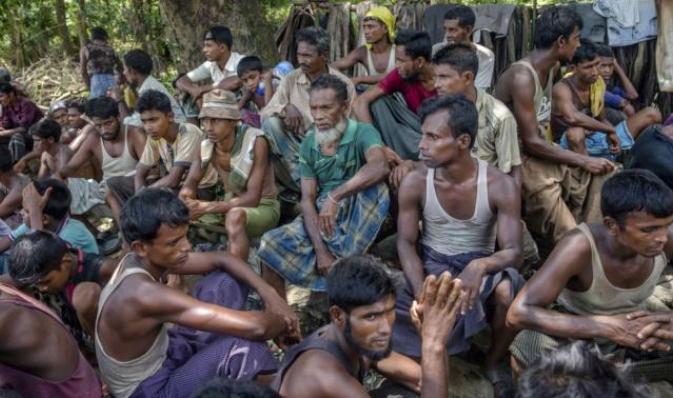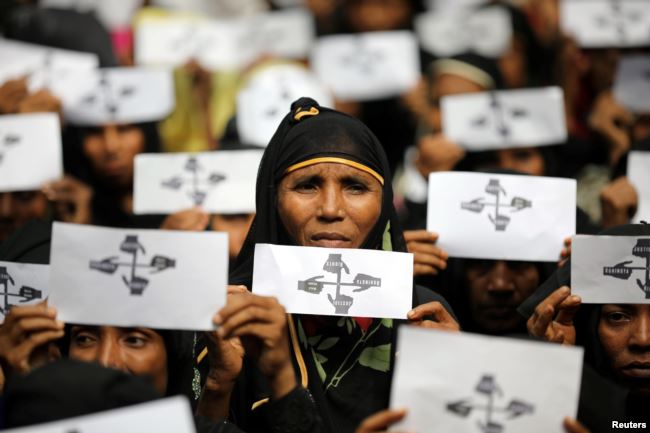
By William Gallo | Pubished by Voice of America on September 25, 2018
Activists are criticizing a long-awaited U.S. State Department investigation into the Myanmar military campaign against Rohingya Muslims, saying the United States should to take a firmer stance on what the activists see as genocide.
The State Department report, released late Monday, blames Myanmar's military for an "extreme, large-scale, widespread" campaign of violence against the Rohingya ethnic minority group over the past two years.
The report, based on interviews with more than 1,000 Rohingya refugees in neighboring Bangladesh, documented graphic descriptions of torture, rape and mass killing in Myanmar's northern Rakhine state.
In some cases, Myanmar soldiers threw infants and small children into open fires and burning huts, witnesses told State Department investigators. Others said they saw soldiers ripping fetuses out of the bellies of pregnant mothers.
The State Department concedes the campaign was "well-planned and coordinated." But, notably, the report makes no determination that any of the violence amounts to genocide or crimes against humanity, and it recommends no specific action.
"This is extremely disappointing for those of us who have no other country to look to but the United States to do something humane and compassionate and principled," said Maung Zarni, a British-Burmese academic and author of The Slow-Burning Genocide of Myanmar's Rohingya.
"This is not like Rwanda or other places where post facto people realized that genocide happened. This is still ongoing," Zarni said.
The press office of U.S. Senator Marco Rubio, a Florida Republican, weighed in as well:
Important @StateDept report on Burmese forces’ atrocities against Rohingya in Rakhine state. I called for the report to be made public, and urged accountability for these crimes against humanity. The State Department must call this what it is: genocide https://t.co/zGwGfbh08j
— Senator Rubio Press (@SenRubioPress) September 25, 2018
Human Rights Watch (HRW) chided the State Department for being "silent on action" and said the U.S. government should follow up the report by imposing new sanctions against those responsible.
"The State Department's report, confirming the systematic brutality of the Burmese military operations, should jolt the U.S. into action," Sarah Margon, Washington director at HRW, said.
In August, the U.S. sanctioned four Myanmar military and police commanders for their involvement in what the State Department then referred to as "ethnic cleansing" in Rakhine state.
The latest report, however, did not use the phrase "ethnic cleansing." But the State Department, in an nonattributed statement, said the investigation's findings "fully support that conclusion" and insisted it would be used to inform future U.S. policy.
"U.S. efforts have been and remain focused on addressing the underlying conduct, encouraging steps that will improve the situation for all people in Burma and those displaced in Burma, and promoting accountability for those responsible for these crimes," the statement said.
Effect of terminology
The term ethnic cleansing carries less weight in international law than do the terms genocide or crimes against humanity. The Trump administration is reportedly divided about whether to apply those labels, in part because some fear it could compel the U.S. to intervene.

British author Zarni stressed that intervention does not have to take the form of bombs or even U.N. peacekeepers. It could instead mean the deployment of temporary human rights observers or civilian advisers to Myanmar's government, he added.
"No one is calling for military intervention. But people want some sort of international mechanism to provide safety for those inside the country and for those who may return," he said. "These are things that need to be discussed — not simply being scared of needing to bomb."
A U.N.-mandated fact-finding mission in August recommended that Myanmar generals be investigated for genocide and crimes against humanity. It said that estimates of 10,000 deaths were "conservative." More than 725,000 Rohingya have fled to Bangladesh over the past year.
Myanmar's military-dominated government denies oppressing the Rohingya. It claims it is responding to a series of attacks by Rohingya militants on police stations.
The Rohingya have long complained of discrimination in Myanmar, including being refused citizenship.
VOA's Cindy Saine contributed to this report.









